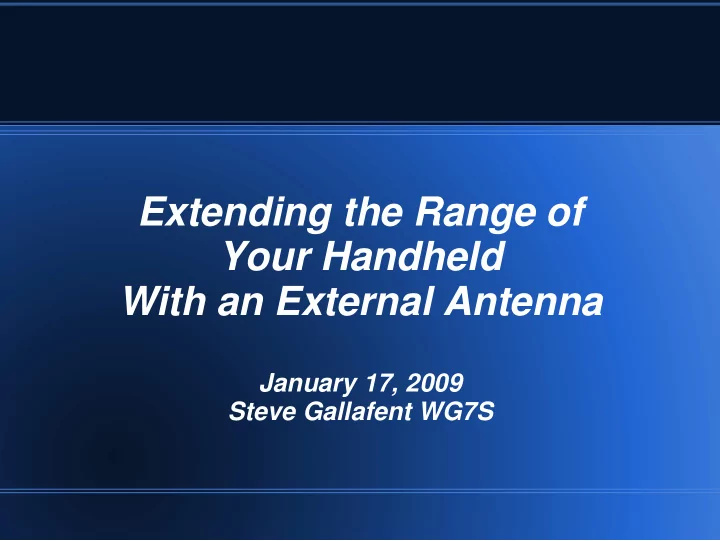

Extending the Range of Your Handheld With an External Antenna January 17, 2009 Steve Gallafent WG7S
Handheld Pros and Cons The Pros The Cons � Low entry cost � Limited transmit power � Portability � Poor antenna � Easy to power
Handheld Communication Range Two components of range: How far does my signal reach? You can't communicate if you can't be heard What can I hear? You can't work what you can't hear
What Can I Hear? Several factors affect what you can hear: � Signal path to the other station � Antenna gain � Other antenna issues � Radio capabilities
Signal Path Signal path affects both the strength of signals you receive and the perceived strength of the signal you transmit. � Height � Obstacles
Antenna Gain Antenna gain (or loss) is a measure of the effect the antenna has on the signal. � Handheld antennas are often referred to as a “dummy load” � A good base antenna can increase signal strength by nearly 10x
Other Antenna Issues Antenna performance is also affected by objects in the “near field region.” � The most common object in the near field region of a handheld is YOU
Calculating Antenna Gain � Antenna gain is expressed in decibels (dB) � Decibel scale is logarithmic � 0 dB = 1x (Unity gain) � 3 dB = 2x � 10 dB = 10x � 20 dB = 100x Gain � dB � Gain = 10 10
Calculating Antenna Gain Radio catalogs often use different suffixes with dB to qualify the gain. � dBi = Relative to an isotropic radiator � dBr = Relative to a reference antenna
Antenna Connectors Handheld radios typically use two different antenna connectors � SMA (about 75% of radios on the market) � BNC (about 25% of radios on the market)
Antenna Connectors Using an external antenna will probably require some kind of adapter that allows you to connect your antenna to the SMA connector on your radio. � Limit wear from repeated connection cycles � Reduce strain on the connector
Antenna Selection There are two approaches you can take to increasing the capability of your handheld antenna. � High-gain whip antenna (attached to radio) � External antenna
Antenna Selection High-gain whip antennas
Antenna Selection High-gain whip antennas � Easy to replace existing antenna � Attached to radio – No need for external cables or changing connections � Can put strain on antenna connector � Make your radio much larger � Can introduce some flutter
Antenna Selection Mobile antennas
Antenna Selection Mobile antennas � Typically designed for use with a ground plane � Easy to set up and take down � Often available with different mounts � Magnet mount � Trunk lip � Design your own from an existing mount
Antenna Selection Base station antennas
Antenna Selection Base station antennas � Large (5 feet to 25 feet) � More difficult to move and set up � Highest gain
Signal Path An external antenna can improve signal path. � Get your antenna up higher � Get the antenna away from obstacles � Separate your antenna from local noise sources
Antenna Gain An external gain antenna improves your ability to transmit and receive. � Higher gain means that your transmitted signal is stronger � Higher gain means that you can receive weaker signals � Position the antenna for optimum performance without having to change operating position
Issues to Consider Base station installations � Convenience � Lightning protection � Antenna mounting
Issues to Consider Portable installations � Ease of setup and take-down � Mounting methods � Typical usage scenarios � Stability and safety
Example Installations Arrow Dual Band J-Pole
Example Installations Arrow Dual-Band J-Pole
Example Installations Arrow Dual-Band J-Pole
Example Installations Arrow Dual-Band J-Pole
Example Installations Arrow Dual-Band J-Pole
Example Installations
Example Installations
Questions?
Recommend
More recommend